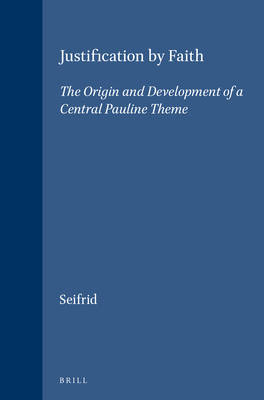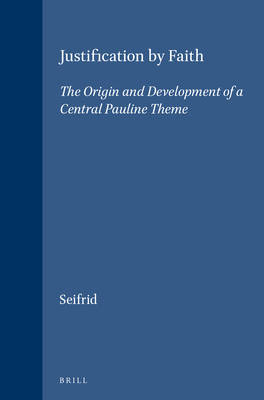
- Afhalen na 1 uur in een winkel met voorraad
- Gratis thuislevering in België vanaf € 30
- Ruim aanbod met 7 miljoen producten
- Afhalen na 1 uur in een winkel met voorraad
- Gratis thuislevering in België vanaf € 30
- Ruim aanbod met 7 miljoen producten
Zoeken
€ 473,45
+ 946 punten
Omschrijving
This study offers a fresh analysis of the place which "justification by faith" held in Paul's life and thought. In distinction from past attempts to define "justification" in relation to a logical "center", the investigation proceeds by assessing the relationship between this theme and two significant points in Paul's career: his conversion and his letter to Rome. The first chapter surveys a number of interpreters of Paul from William Wrede through E.P. Sanders. In an attempt to overcome the deficiencies of earlier proposals, the work then explores the soteriology of two early Jewish writings proximate to Paul, 1QS and Pss. Sol. Paul's references to his preconversion life reveal a connection between these forms of Judaism and that which Paul knew, making it likely that within a short time after his conversion Paul's soteriology underwent a radical change involving his adoption of ideas inherent to his later arguments on "justification by faith". Paul's aim in writing to Rome discloses that he came to regard "justification" as indispensable to his Gospel and relevant to issues beyond Jew-Gentile relations.
This research challenges the "new perspective on Paul" (Dunn) while providing a historical and theological description of Paul's understanding of "justification by faith."
This research challenges the "new perspective on Paul" (Dunn) while providing a historical and theological description of Paul's understanding of "justification by faith."
Specificaties
Betrokkenen
- Auteur(s):
- Uitgeverij:
Inhoud
- Aantal bladzijden:
- 328
- Taal:
- Engels
- Reeks:
- Reeksnummer:
- nr. 68
Eigenschappen
- Productcode (EAN):
- 9789004095212
- Verschijningsdatum:
- 1/08/1992
- Uitvoering:
- Hardcover
- Formaat:
- Genaaid
- Afmetingen:
- 165 mm x 241 mm
- Gewicht:
- 730 g

Alleen bij Standaard Boekhandel
+ 946 punten op je klantenkaart van Standaard Boekhandel
Beoordelingen
We publiceren alleen reviews die voldoen aan de voorwaarden voor reviews. Bekijk onze voorwaarden voor reviews.











